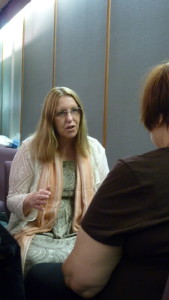With the nights getting cooler many are dreaming of leaves transitioning from bright green to yellow and red. You may find yourself pulling in more and beginning to think of nesting. Much of your contact this fall will be time spent with friends on social media such as Facebook, Twitter and Instagram. You may also connect with friends on Facetime and Skype. Maybe you use your phone and share with friends while you are walking.
As a therapist, I often hear clients say they saw their friend or boyfriend/girlfriend change their status on Facebook from single to being in relationship with . . . They process the response to this very public demonstration of relationship status.
This leads me to think about boundaries. For many years I have created fairly rigid boundaries around myself. Since I am sensitive, this has helped me manage my energy. Being public as a therapist and psychic invites a lot of people into my space.
Recently, I had a visitation from my former husband, Peter Campbell who passed several years ago. He came to me with a powerful message (which I’ll share in another blog) and this opened up my heart. Now, I find myself crying a lot, which has not happened for many years. I find I welcome this opening, but now have to reassess how to shift my boundaries.
I hope this helps in case you want to reassess your boundaries as well. Do you have rigid, collapsed or healthy boundaries? You may want to print this out and talk about it with a friend.
[clickToTweet tweet=”Do you checked your boyfriend’s Facebook page to see who he contacts? http://bit.ly/2hGeB1D” quote=”Do you check your lover’s phone or Facebook page to see who they connect with?”]
Boundaries
Are you more likely to allow others to cross your boundaries or do you cross others boundaries?
Do you find you get too close to people physically and you see them back away?
Do you find yourself alone in a corner in a group and not reaching out to others?
The way you set your boundaries changes over time and also in different situations and dependent upon how you feel at the time. This is a general guideline you can use.
Collapsed Boundaries can be identified by:
- Sharing too much personal information too soon.
- Saying yes when you want to say no for fear of rejection.
- Doing anything to avoid conflict.
- Having a high tolerance for abuse.
Rigid Boundaries can be identified by:
- Saying no to a request if it will involve close interaction.
- Staying so busy you don’t take time for intimate relationships.
- Being unable to identify you own feelings, wants or needs.
- Making little self-disclosure and holding people at a distance.
Healthy Boundaries can be identified by:
- Having the ability to say yes and to say no.
- Being able to hear no from others and seek other resources to get your needs met.
- You reveal information about yourself gradually and self-disclose appropriately.
- You have relationships with shared responsibility for the relationship without blaming.
[clickToTweet tweet=”Do you have a karmic relationship? https://energymedicinedna.com/intuitive-readings/” quote=”Do you have karma with your partner? Do you share a past life?”]
Contact Candess for a Psychic Reading!



